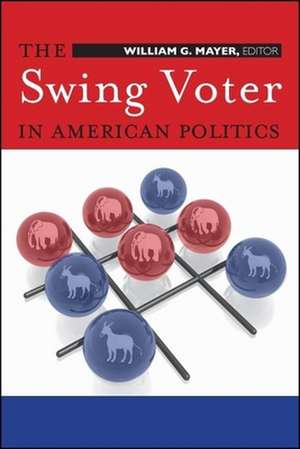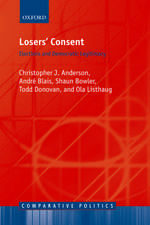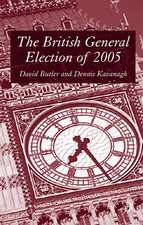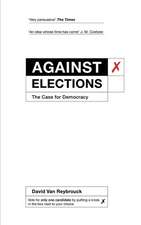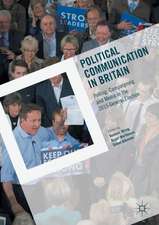The Swing Voter in American Politics
Editat de William G. Mayeren Limba Engleză Paperback – 8 ian 2008
The "swing voter" occupies a cherished place in American political lore. Candidates court swing voters, consultants target them, and pundits speculate constantly on which way they will lean. But nobody has adequately defined them as a group. What exactly is a swing voter? No one really seems to know. T he Swing Voter in American Politics fills this conceptual gap. The book brings political scientists and pollsters together to answer four basic questions: What is a swing voter? How can analysts use survey data to identify swing voters? How do swing voters differ—if at all—from the rest of the electorate? And what role do swing voters play in determining the outcomes of contemporary elections? Drawing on a wide range of sources, including American National Election Studies Data, Gallup polls, Pew Center surveys, and the National Annenberg Election Survey, the contributors track swing voters across six decades and in national and local elections. The result is an unprecedented picture of this key political group, just in time for the 2008 campaigns. Contributors include James E. Campbell (University of Buffalo), April Clark (Pew Research Center for the People & the Press), Adam Clymer (Annenberg Public Policy Center, University of Pennsylvania), Michael Dimock (Pew Research Center for the People & the Press), Juliana Menasce Horowitz (Pew Research Center for the People & the Press), Jeffrey M. Jones (Gallup Organization), Daron R. Shaw (University of Texas–Austin), Jeffrey M. Stonecash (Syracuse University), Ken Winneg (Annenberg Public Policy Center, University of Pennsylvania).
Preț: 209.41 lei
Nou
Puncte Express: 314
Preț estimativ în valută:
40.08€ • 41.69$ • 33.08£
40.08€ • 41.69$ • 33.08£
Carte tipărită la comandă
Livrare economică 14-28 aprilie
Preluare comenzi: 021 569.72.76
Specificații
ISBN-13: 9780815755319
ISBN-10: 0815755317
Pagini: 151
Ilustrații: black & white tables, figures
Dimensiuni: 152 x 229 x 12 mm
Greutate: 0.24 kg
Editura: Brookings Institution Press
Colecția Brookings Institution Press
ISBN-10: 0815755317
Pagini: 151
Ilustrații: black & white tables, figures
Dimensiuni: 152 x 229 x 12 mm
Greutate: 0.24 kg
Editura: Brookings Institution Press
Colecția Brookings Institution Press
Notă biografică
William G. Mayer is associate professor of political science at Northeastern University. His books include The Front-Loading Problem in Presidential Nominations, written with Andrew E. Busch (Brookings, 2004), and The Making of the Presidential Candidates 2004 (Rowman and Littlefield, 2003).
Descriere
The "swing voter" occupies a cherished place in American political lore. Candidates court swing voters, consultants target them, and pundits speculate constantly on which way they will lean. But nobody has adequately defined them as a group. What exactly is a swing voter? No one really seems to know. T he Swing Voter in American Politics fills this conceptual gap. The book brings political scientists and pollsters together to answer four basic questions: What is a swing voter? How can analysts use survey data to identify swing voters? How do swing voters differ—if at all—from the rest of the electorate? And what role do swing voters play in determining the outcomes of contemporary elections? Drawing on a wide range of sources, including American National Election Studies Data, Gallup polls, Pew Center surveys, and the National Annenberg Election Survey, the contributors track swing voters across six decades and in national and local elections. The result is an unprecedented picture of this key political group, just in time for the 2008 campaigns. Contributors include James E. Campbell (University of Buffalo), April Clark (Pew Research Center for the People & the Press), Adam Clymer (Annenberg Public Policy Center, University of Pennsylvania), Michael Dimock (Pew Research Center for the People & the Press), Juliana Menasce Horowitz (Pew Research Center for the People & the Press), Jeffrey M. Jones (Gallup Organization), Daron R. Shaw (University of Texas–Austin), Jeffrey M. Stonecash (Syracuse University), Ken Winneg (Annenberg Public Policy Center, University of Pennsylvania).
